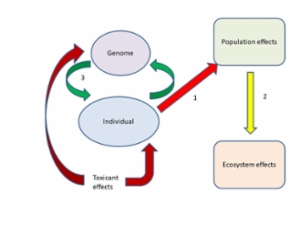Environmental changes and pollution will only have an ecological effect, if they affect the function of some organisms in the ecosystem. Consequently, any environmental effect must be primarily functional, i.e. physiological. Toxicology is studying functional disturbances.
On the basis of the above three lines, environmental (and also evolutionary) biology must be based on functional studies and explanations. In view of this, it is very inappropriate that environmental physiology remains a minor discipline in enviro nmental biology and toxicology, and evolutionary biology as compared to ecology and genetics. My ecologist and geneticist friends always disagree with this, and give the following arguments. The ecologist says that many of the effects are indirect, which thus shows that only ecological studies can explain the effects. However, the effect may be indirect to the species (or group) one is studying, but there must be a functional effect on some organism in the ecosystem. If there weren’t, there would be no change. The geneticist and evolutionary biologist says that only the genetic changes will be transmitted to future generations. Thus, if an environmental change has an effect in the genome, that will be the important effect. While it is true that only genetically coded effect will be transmitted over many generations, a genetic change will only manifest itself if it affects the functions of organism in such a way that fitness (i.e. the number of offspring reaching sexual maturity) is affected. If the genetic change does not affect any functions, it is neutral both from the environmental and evolutionary viewpoint.
nmental biology and toxicology, and evolutionary biology as compared to ecology and genetics. My ecologist and geneticist friends always disagree with this, and give the following arguments. The ecologist says that many of the effects are indirect, which thus shows that only ecological studies can explain the effects. However, the effect may be indirect to the species (or group) one is studying, but there must be a functional effect on some organism in the ecosystem. If there weren’t, there would be no change. The geneticist and evolutionary biologist says that only the genetic changes will be transmitted to future generations. Thus, if an environmental change has an effect in the genome, that will be the important effect. While it is true that only genetically coded effect will be transmitted over many generations, a genetic change will only manifest itself if it affects the functions of organism in such a way that fitness (i.e. the number of offspring reaching sexual maturity) is affected. If the genetic change does not affect any functions, it is neutral both from the environmental and evolutionary viewpoint.
In fact, function (i.e. physiology) is what makes a difference between a stone and organism. A stone could have exactly the same molecules as an animal, but without functions (physiology) it would still be a stone.

 nmental biology and toxicology, and evolutionary biology as compared to ecology and genetics. My ecologist and geneticist friends always disagree with this, and give the following arguments. The ecologist says that many of the effects are indirect, which thus shows that only ecological studies can explain the effects. However, the effect may be indirect to the species (or group) one is studying, but there must be a functional effect on some organism in the ecosystem. If there weren’t, there would be no change. The geneticist and evolutionary biologist says that only the genetic changes will be transmitted to future generations. Thus, if an environmental change has an effect in the genome, that will be the important effect. While it is true that only genetically coded effect will be transmitted over many generations, a genetic change will only manifest itself if it affects the functions of organism in such a way that fitness (i.e. the number of offspring reaching sexual maturity) is affected. If the genetic change does not affect any functions, it is neutral both from the environmental and evolutionary viewpoint.
nmental biology and toxicology, and evolutionary biology as compared to ecology and genetics. My ecologist and geneticist friends always disagree with this, and give the following arguments. The ecologist says that many of the effects are indirect, which thus shows that only ecological studies can explain the effects. However, the effect may be indirect to the species (or group) one is studying, but there must be a functional effect on some organism in the ecosystem. If there weren’t, there would be no change. The geneticist and evolutionary biologist says that only the genetic changes will be transmitted to future generations. Thus, if an environmental change has an effect in the genome, that will be the important effect. While it is true that only genetically coded effect will be transmitted over many generations, a genetic change will only manifest itself if it affects the functions of organism in such a way that fitness (i.e. the number of offspring reaching sexual maturity) is affected. If the genetic change does not affect any functions, it is neutral both from the environmental and evolutionary viewpoint.